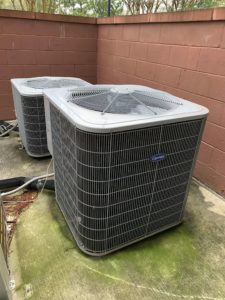Knowing The Reasons Why Spring AC Capacitor Malfunctioning
What Can Make The AC Capacitor Go Wrong In Spring?
Capacitors are system components that first store up and then secondly release energy within a circuit as it is needed. Bigger capacitors usually have both a better ability to handle currents as well as more abundant charge storage capacity. Attributes like these are useful in air conditioning equipment since there are A/C compressors that require energy pulses three to five times the standard just to get started. For applications like these, start capacitors are ideal. Other various electric motors throughout the system might use lower-level capacitors in order to keep things spinning efficiently.

A Trio Of Motors
An air conditioning system needs a trio of motors. The first is an electric blower located indoors in order to circulate cool air. The second is an electric condenser fan that is outdoors in order to push the hot air out through an exhaust. The third is a compressor motor whose function is pumping refrigerant throughout the system. Every one of these motors has a capacitor it relies on to start up whenever the system thermostat indicates it is time to activate the system. Quite often, capacitors are also used in keeping these three motors operating in peak condition. Of all the capacitors, the one in the compressor is usually the biggest, since compressors need substantially more power than either of the other two.
Too Much Heat
An electrolytic air conditioner capacitor has an internal moist separator. If things get too hot inside of the unit, things can dry out to the point of triggering a short circuit internally. If a capacitor withstands temperatures at or in excess of 150F on a regular basis, it can fail.
An Overload Of Electricity
An A/C capacitor is intended to launch fan motors and the compressor up to 75 percent of their operating speed before disengaging. However, it’s not designed for a steady electrical load. If the motor burns out or even unable to turn due to a physical blockage, then the capacitor is likely to overload, possibly to the point of destruction. Any voltage that is over the capacitor’s rated value can also be a source of destruction and damage. For instance, a power surge that happens due to a lightning strike might create a serious spike in current that could likely ‘fry’ the capacitor.
Damaged And/Or Worn-Out Parts
A capacitor has to disengage in mere seconds, or it’s going to risk overheating. A fan motor or compressor which drags because of worn bearings or damage might wind up burning up the capacitor. Another reason that a capacitor might overheat is that a malfunctioning relay switch is left in the circuit longer than it should. Lightning is always a potential source of damage for a compressor, capacitor, fan motor, or unit wiring. Even weaker power surges can be a cause of damage or destruction for a capacitor, leading to an overload of the compressor and all the resulting failures. Any capacitor which is leaking oil is showing a definite indication of issues that need to be addressed.
Service Cycle
Even when an air conditioner capacitor is protected from improper electrical loads, overheating, electrical surges, and damage, it’s still going to wind up failing sooner or later just due to normal wear and tear. The service cycle of air conditioner capacitors varies quite a bit, with usage patterns and local climate being primary factors. Having said that, the usual rating is only six years.
If you want to get the very best HVAC services in this community and its surrounding areas, contact us or call us right away! Visit our blog for more related articles.
